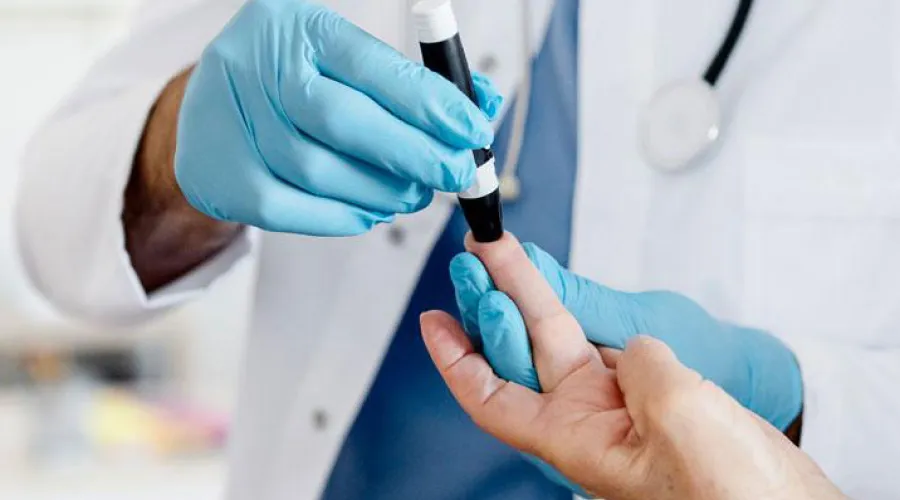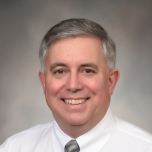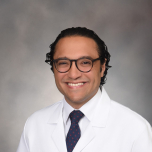
Endocrinology, Diabetes, and Metabolism Fellowship
Two-Year ACGME Training Program
The subspecialty fellowship in endocrinology, diabetes, and metabolism at the University of Kentucky is designed to train physicians in the knowledge, skills, and experience required for excellence in endocrinology. The trainees who successfully complete this program will be fully training and equipped to function as clinical endocrinologists, clinical educators, or clinician scientists, depending on the individual career goals.
The first goal of the fellowship is to provide comprehensive training through the care of inpatients and outpatients. We comprehensively manage a wide range of endocrine diseases, emphasizing clinical features, diagnosis, treatment, and long-term care of patients. The trainees acquire the knowledge base, cognitive skills, and humanistic attributes necessary to be an effective endocrinologist.
Year 1
In the first year, the fellow will manage the endocrine inpatient consult service for four months of the year and cover one weekend per month on call. Our first-year fellows also have two continuity clinics in which we see a variety of general endocrinology patients. Our fellows also spend short rotations (four to eight weeks) in a variety of endocrine specialty clinics each week. In addition, the fellow will have formal didactic training in the form of clinical conferences, journal clubs, research seminars, and lectures on core curriculum topics.
Year 2
In the second year, the fellow will manage the inpatient consult service for two months, cover one weekend a month, continue three weekly continuity clinics, and elective specialty clinics. The remainder of the time will be reserved for pursuing research (see below) or completing other types of scholarly work.
Year 3 (Optional)
The program offers an optional third year for individuals wishing to pursue careers in academic endocrinology and desire time to further develop their clinical educator and clinical researcher skill sets.
Ordering and Interpreting Tests
The fellow will learn to order and interpret appropriate measures of hormone levels and action, including performance and interpretation of stimulation and suppression tests. Training in radiological evaluation of endocrine diseases including ultrasound of the neck, nuclear medicine, CT and MRI imaging of endocrine tissues, and evaluation of bone density and other tests evaluating metabolic bone disease will be provided. The fellow will learn to perform and interpret results from fine needle aspirations of the thyroid. The fellow will receive instruction in pancreatic and islet cell transplantation.
Facilities and Resources
The major teaching institution is the University of Kentucky, an acute care general/surgical hospital with 569 beds and 100 intensive care beds. A second facility is the adjacent Lexington Veterans Affairs (VA) Hospital on Cooper Drive, also an acute care general medical/surgical hospital with 199 beds and two intensive care units.
Both hospitals provide full-time comprehensive nuclear medicine and special diagnostic radiological procedures. Outpatient clinics are located in the UK Turfland Clinic, UK HealthCare’s Good Samaritan Hospital, and the VA Hospital. Currently, there are monthly volumes greater than 1,000 endocrinology outpatient encounters. There is dedicated high-resolution ultrasound equipment for thyroid ultrasonography and DEXA equipment for bone densitometry in the clinics.
The University of Kentucky has a complete biochemistry laboratory and facilities for hormonal immunoassays, as well as access to karyotyping and immunohistologic studies. Nuclear imaging, ultrasounds, and full radiology facilities are present at the University of Kentucky. The endocrine faculty has close working relationships with nutrition services, specialists in surgery, nephrology, neurosurgery, obstetrics and gynecology, ophthalmology, pediatrics, podiatry, and urology. The University of Kentucky hospital system encompasses services for children, adolescents, and adults.
The fellows will have dedicated office space with computer access at the College of Medicine's space at UK Turfland Clinic with access to the medical library, hospitals, and clinics. The division has full-time administrative support which arranges outpatient consults and scheduling and assists with physician and patient communications.
Location: Barnstable Brown Kentucky Diabetes and Endocrinology Clinic – Medical Specialties
UK HealthCare at Turfland
2195 Harrodsburg Road, Suite 125
Lexington, KY 40504
Facilities and Resources
The major teaching institution is the University of Kentucky, an acute care general/surgical hospital with 569 beds and 100 intensive care beds. A second facility is the adjacent Lexington Veterans Affairs (VA) Hospital on Cooper Drive, also an acute care general medical/surgical hospital with 199 beds and two intensive care units.
Both hospitals provide full-time comprehensive nuclear medicine and special diagnostic radiological procedures. Outpatient clinics are located in the UK Turfland Clinic, UK HealthCare’s Good Samaritan Hospital, and the VA Hospital. Currently, there are monthly volumes greater than 1,000 endocrinology outpatient encounters. There is dedicated high-resolution ultrasound equipment for thyroid ultrasonography and DEXA equipment for bone densitometry in the clinics.
The University of Kentucky has a complete biochemistry laboratory and facilities for hormonal immunoassays, as well as access to karyotyping and immunohistologic studies. Nuclear imaging, ultrasounds, and full radiology facilities are present at the University of Kentucky. The endocrine faculty has close working relationships with nutrition services, specialists in surgery, nephrology, neurosurgery, obstetrics and gynecology, ophthalmology, pediatrics, podiatry, and urology. The University of Kentucky hospital system encompasses services for children, adolescents, and adults.
The fellows will have dedicated office space with computer access at the College of Medicine's space at UK Turfland Clinic with access to the medical library, hospitals, and clinics. The division has full-time administrative support which arranges outpatient consults and scheduling and assists with physician and patient communications.
Location: Barnstable Brown Kentucky Diabetes and Endocrinology Clinic – Medical Specialties
UK HealthCare at Turfland
2195 Harrodsburg Road, Suite 125
Lexington, KY 40504
Clinical Rotations
The fellow will participate in two-to-three half-day general endocrinology continuity clinics per week. In this setting the fellow will assume the consultant provider role; however, every patient will be reviewed with an attending endocrinologist who will ultimately be responsible for the care provided. The fellow will see new patients referred to endocrinology and will continue to follow these patients until endocrinology is no longer required. The fellow will have clinics scheduled with three to four different endocrine attending physician faculty over the course of two years, thus ensuring exposure to a variety of approaches and perspectives. The fellow will not be responsible for medical students or residents in the ambulatory care setting.
To ensure the fellow has adequate exposure to a broader clinical faculty and additional related endocrine disciplines, the trainee will rotate through specialty clinics one half-day each week. The fellow will spend four to eight weeks in each specialty clinic the first year with the option of spending additional time the second year based on interest or educational needs.
The specialty clinics comprise:
- Thyroid ultrasonography/biopsy
- Metabolic bone disorders
- Adrenal/pituitary
- Pediatric endocrinology
- Diabetes
- Thyroid cancer
- Reproductive endocrinology
- Endocrine surgery
- Weight management
Clinical Rotations
The fellow will participate in two-to-three half-day general endocrinology continuity clinics per week. In this setting the fellow will assume the consultant provider role; however, every patient will be reviewed with an attending endocrinologist who will ultimately be responsible for the care provided. The fellow will see new patients referred to endocrinology and will continue to follow these patients until endocrinology is no longer required. The fellow will have clinics scheduled with three to four different endocrine attending physician faculty over the course of two years, thus ensuring exposure to a variety of approaches and perspectives. The fellow will not be responsible for medical students or residents in the ambulatory care setting.
To ensure the fellow has adequate exposure to a broader clinical faculty and additional related endocrine disciplines, the trainee will rotate through specialty clinics one half-day each week. The fellow will spend four to eight weeks in each specialty clinic the first year with the option of spending additional time the second year based on interest or educational needs.
The specialty clinics comprise:
- Thyroid ultrasonography/biopsy
- Metabolic bone disorders
- Adrenal/pituitary
- Pediatric endocrinology
- Diabetes
- Thyroid cancer
- Reproductive endocrinology
- Endocrine surgery
- Weight management
Research Experience
An integral part of the training program is exposure to clinical investigation. In conjunction with a faculty advisor, trainees conceive clinical research projects, design protocols, gather and analyze data, and draw appropriate conclusions.
The trainee will be introduced to clinical and laboratory research in the first year by rotating through three research laboratories pursuing either clinical or basic research into topics related to endocrinology. By the end of the first year, the fellow will be required to select a research mentor, and in the second year, will engage in a carefully defined project. This research experience will include training in hypothesis-driven research, statistical analysis of data, and presentation of data in written and/or oral formats. Fellows interested in pursuing research careers will be encouraged to write grant funding proposals.
Trainees will be encouraged to participate in local and national research meetings. In general, each trainee will attend one national meeting a year relevant to endocrinology. Fellows will be expected to submit case reports and clinical reviews for publication during their first year. In their second year, fellows will be strongly encouraged to submit a research abstract to a national meeting and develop a research manuscript for publication.
Research Experience
An integral part of the training program is exposure to clinical investigation. In conjunction with a faculty advisor, trainees conceive clinical research projects, design protocols, gather and analyze data, and draw appropriate conclusions.
The trainee will be introduced to clinical and laboratory research in the first year by rotating through three research laboratories pursuing either clinical or basic research into topics related to endocrinology. By the end of the first year, the fellow will be required to select a research mentor, and in the second year, will engage in a carefully defined project. This research experience will include training in hypothesis-driven research, statistical analysis of data, and presentation of data in written and/or oral formats. Fellows interested in pursuing research careers will be encouraged to write grant funding proposals.
Trainees will be encouraged to participate in local and national research meetings. In general, each trainee will attend one national meeting a year relevant to endocrinology. Fellows will be expected to submit case reports and clinical reviews for publication during their first year. In their second year, fellows will be strongly encouraged to submit a research abstract to a national meeting and develop a research manuscript for publication.
Barnstable Brown Diabetes Center
Learn more about UK's leading education, treatment, and research center for diabetes.
Program Director

Simon Fisher, MD, PhD
Positions Held:
- Professor
- Chief, Division of Endocrinology, Diabetes and Metabolism
- Vice Chair for Research and Innovation, Internal Medicine
Associate Program Director

Omar M El Kawkgi, MD
Positions Held:
- Assistant Professor
- Associate Program Director, Endocrinology Diabetes and Metabolism Fellowship